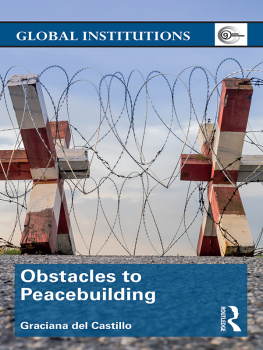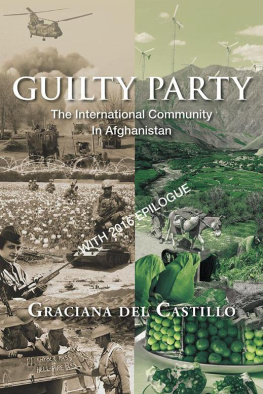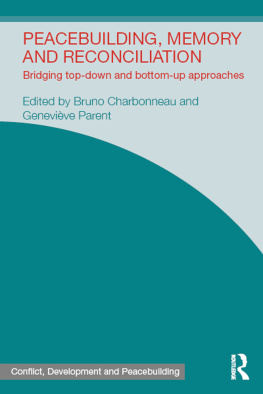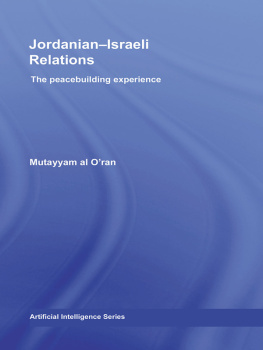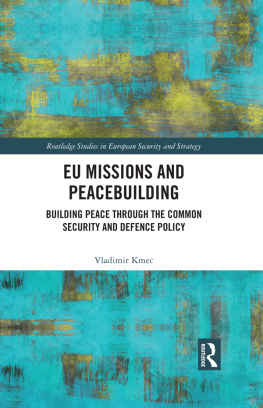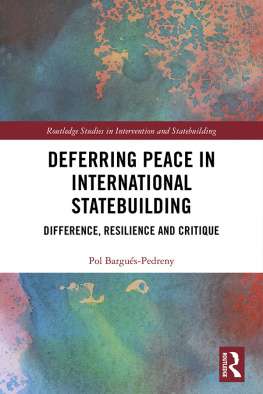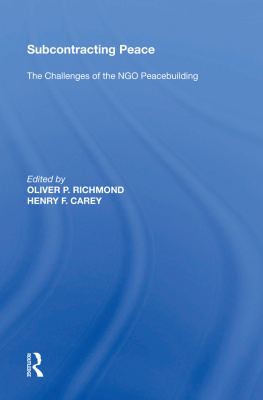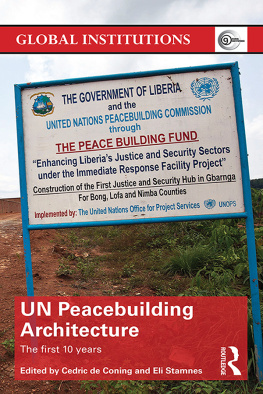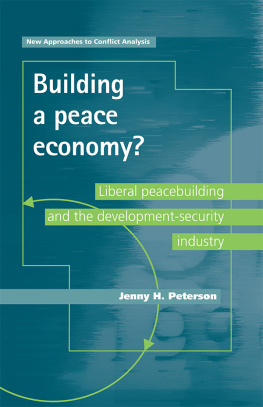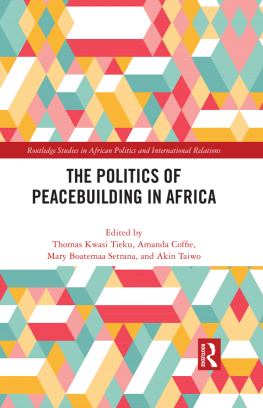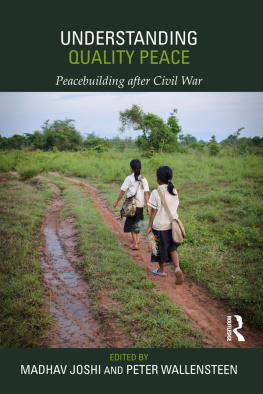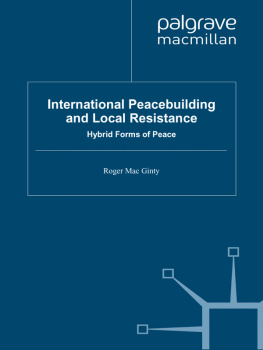Graciana del Castillos books have demonstrated that peace is far too difficult to leave to the generals, diplomats, peacekeepers, lawyers and political scientists. She shows that sustainable peace without economic transformation is close to impossible. This volume advances that important body of work, drawing crucial distinctions among the phases of economic transformation and proposing novel solutions to the persistent failure of the international community to play its proper role in the design and implementation of the political economy of peace.
Michael Doyle, University Professor, Columbia University and author of The Question of Intervention (Yale, 2015)
From hard lessons of the past, Graciana del Castillo works to build a new paradigm for the vital economics of peace and reconstruction that applies in the critical period of transition between war and normal economic development.
Roger B. Myerson, Glen A. Lloyd Distinguished Service Professor, University of Chicago. Winner of the 2007 Nobel Prize in Economics
Peacebuilding is much lionized, but rarely lives up to expectations. This is doubly puzzling as the UN has been engaged in peacebuilding for several decades. This excellent, admirably compact volume explains the need for active UN peacebuilding and the multiple challenges it faces. Graciana del Castillo is an economically literate, politically acute analyst committed above all to positive results on the ground. She is uniquely qualified to decode the objectives and challenges involved having been a lead actor in peacebuilding.
Dr. David M. Malone, Rector of the United Nations University and Under-Secretary-General of the United Nations
Accessible and unencumbered by jargon, Obstacles to Peacebuilding is an authoritative, hard-hitting and unvarnished assessment of the UNs underwhelming recordwhen it comes to helping countries recover from war and protracted conflict. It is an excellent and timely study, covering a broad canvas of cases and pregnant with policy implications. Of interest to practitioners, scholars and students alike, this is a contribution to the literature that deserves a very wide readership.
Mats Berdal, Professor of Security and Development, Kings College London and author of Building Peace After War (Routledge, 2009)
Much has been learned about building peace, stability and prosperity in countries undergoing security and political reform, national reconciliation, and economic reconstruction. With her critical eye, Graciana del Castillo pulls it all together in this tightly written, insightful and compelling book.
Ambassador Enrique ter Horst, former SRSG in El Salvador and Haiti and Assistant Secretary-General in the Office of the Director-General for Development and International Economic Cooperation
Obstacles to Peacebuilding
Combining the insights of a seasoned practitioner with the academic rigor of a meticulous policy and risk analyst, Graciana del Castillo discusses the major obstacles to peacebuilding that need to be removed before war-torn countries can move towards peace, stability, and prosperity. As Secretary-General Antnio Guterres assumes leadership in January 2017, a top priority must be to address the bleak peacebuilding record where over half of the countries under UN watch relapse back into conflict within a decade.
While policy debate and the academic literature have focused on the security, political, and social aspects of the war-to-peace transition, this book focuses on the economic transition that is, economic reconstruction or the political economy of peace which, in the authors view, is the much-neglected aspect of peacebuilding. The book argues that rebuilding war-torn states effectively has acquired a new sense of urgency as extremist groups increasingly recruit people by providing jobs and services to those deprived of them due to government and economic failures.
Based on past lessons and best practices of the last quarter of a century, the author makes recommendations to move forward and improve the record. It will be of great use to students and scholars of peacebuilding, as well as policymakers in national governments, donor countries and international organizations involved in peacebuilding, statebuilding, and development.
Graciana del Castillo is senior fellow at the Ralph Bunche Institute for International Studies, a member of the Council on Foreign Relations and of several boards. She holds a Ph.D. in Economics from Columbia University where she was adjunct professor, senior research scholar, and associate director of the Center for Capitalism & Society. She has published extensively and is the author of Rebuilding War-Torn States (2008).
lvaro de Soto (author of the Foreword) is a former Under-Secretary-General of the United Nations.
Global Institutions
Edited by Thomas G. Weiss
The CUNY Graduate Center, New York, USA
and Rorden Wilkinson
University of Sussex, Brighton, UK
About the series
The Global Institutions Series provides cutting-edge books about many aspects of what we know as global governance. It emerges fromour shared frustrations with the state of available knowledge-electronic and print-wise, for research and teaching-in the area.The series is designed as a resource for those interested in exploring issues of international organization and global governance. And since the first volumes appeared in 2005, we have taken significant strides toward filling conceptual gaps.
The series consists of three related streams distinguished by their blue, red, and green covers. The blue volumes, comprising the majority of the books in the series, provide user-friendly and short (usually no more than 50,000 words) but authoritative guides to major global and regional organizations, as well as key issues in the global governance of security, the environment, human rights, poverty, and humanitarian action among others. The books with red covers are designed to present original research and serve as extended and more specialized treatments of issues pertinent for advancing understanding about global governance. And the volumes with green covers-the most recent departure in the series-are comprehensive and accessible accounts of the major theoretical approaches to global governance and international organization.
The books in each of the streams are written by experts in the field, ranging from the most senior and respected authors to first-rate scholars at the beginning of their careers. In combination, the three components of the series-blue, red, and green-serve as key resources for faculty, students, and practitioners alike. The works in the blue and green streams have value as core and complementary readings in courses on, among other things, international organization, global governance, international law, international relations, and international political economy; the red volumes allow further reflection and investigation in these and related areas.
The books in the series also provide a segue to the foundation volume that offers the most comprehensive textbook treatment available dealing with all the major issues, approaches, institutions, and actors in contemporary global governance-our edited work International Organization and Global Governance (2014)-a volume to which many of the authors in the series have contributed essays.
Understanding global governance-past, present, and future-is far from a finished journey. The books in this series nonetheless represent significant steps toward a better way of conceiving contemporary problems and issues as well as, hopefully, doing something to improve world order. We value the feedback from our readers and their role in helping shape the on-going development of the series.

